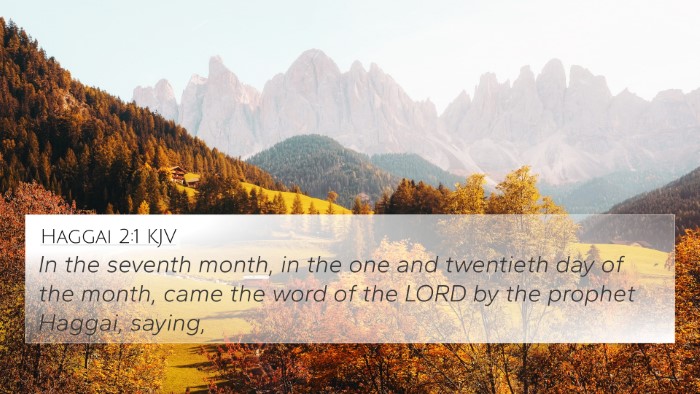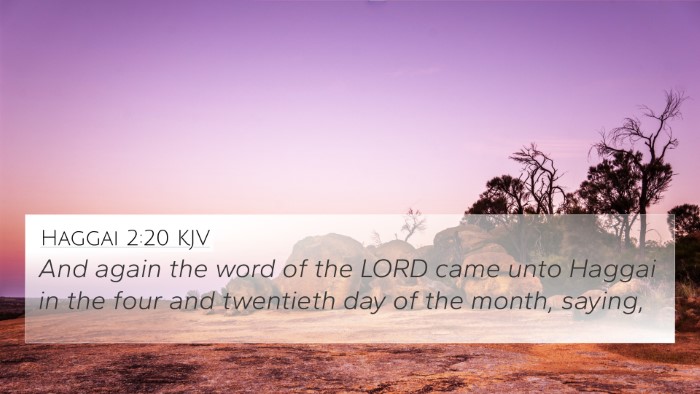Old Testament
Genesis Exodus Leviticus Numbers Deuteronomy Joshua Judges Ruth 1 Samuel 2 Samuel 1 Kings 2 Kings 1 Chronicles 2 Chronicles Ezra Nehemiah Esther Job Psalms Proverbs Ecclesiastes Song of Solomon Isaiah Jeremiah Lamentations Ezekiel Daniel Hosea Joel Amos Obadiah Jonah Micah Nahum Habakkuk Zephaniah Haggai Zechariah MalachiHaggai 1:15 Similar Verses
Haggai 1:15 Cross References
In the four and twentieth day of the sixth month, in the second year of Darius the king.
Uncover the Rich Themes and Topics of This Bible Verse
Listed below are the Bible themes associated with Haggai 1:15. We invite you to explore each theme to gain deeper insights into the Scriptures.
Haggai 1:15 Cross Reference Verses
This section features a detailed cross-reference designed to enrich your understanding of the Scriptures. Below, you will find carefully selected verses that echo the themes and teachings related to Haggai 1:15 KJV. Click on any image to explore detailed analyses of related Bible verses and uncover deeper theological insights.

Haggai 1:1 (KJV) »
In the second year of Darius the king, in the sixth month, in the first day of the month, came the word of the LORD by Haggai the prophet unto Zerubbabel the son of Shealtiel, governor of Judah, and to Joshua the son of Josedech, the high priest, saying,

Haggai 2:10 (KJV) »
In the four and twentieth day of the ninth month, in the second year of Darius, came the word of the LORD by Haggai the prophet, saying,

Haggai 2:1 (KJV) »
In the seventh month, in the one and twentieth day of the month, came the word of the LORD by the prophet Haggai, saying,

Haggai 2:20 (KJV) »
And again the word of the LORD came unto Haggai in the four and twentieth day of the month, saying,
Haggai 1:15 Verse Analysis and Similar Verses
Understanding Haggai 1:15
Haggai 1:15 states:
“In the second year of Darius the king, in the sixth month, in the first day of the month, came the word of the Lord by Haggai the prophet unto Zerubbabel the son of Shealtiel, governor of Judah, and to Joshua the son of Josedech, the high priest, saying,” (Haggai 1:15, KJV)
Interpretation and Meaning
The book of Haggai, written during a time of significant restoration, addresses the people of Israel as they return from exile. Haggai's prophecies geared towards motivating the Israelites to rebuild the temple highlight the urgency of their spiritual and national responsibilities.
Contextual Background
Haggai prophesies in the midst of a national crisis. The Israelites returned from Babylonian captivity but faced challenges that hindered their ability to construct the temple. This verse sets the stage for the prophetic messages that follow, emphasizing God's timing and the roles of key leaders.
Insights from Public Domain Commentaries
- Matthew Henry: He emphasizes the accountability of leaders, like Zerubbabel and Joshua, in responding to God's call. The historical context of the second year of Darius places the emphasis on God's sovereignty over nations and His continued concern for His people.
- Albert Barnes: Barnes notes the significance of the date mentioned. This specific time frame underlines the historical accuracy of Haggai's message and shows that God's communication comes at pivotal moments in history, calling His people to action.
- Adam Clarke: Clarke mentions that the date is crucial for understanding the timeline of events in the restoration. He also highlights the spiritual implications of neglecting God's house, suggesting that the people's material concerns should not overshadow their devotion to God.
Cross-References for Haggai 1:15
- Ezra 5:1-2: The prophetic ministry of Haggai parallels with the encouragement given to the people in Ezra as they rebuild the temple.
- Zachariah 1:1: Provides further insight into the prophetic messages during the same period, showcasing God's ongoing communication with His people.
- Malachi 3:1: Connects with the theme of God sending messengers to prepare the way, encouraging spiritual renewal.
- Isaiah 40:3: This verse fortifies the idea of God addressing His people through prophets, offering hope for restoration.
- Jeremiah 29:10-11: Offers a promise of returning and restoration, linking the themes of hope and divine planning to God's words through Haggai.
- Psalm 127:1: Reminds of the necessity of God’s involvement in labor, echoing Haggai's theme of prioritizing the temple's rebuilding.
- 1 Corinthians 3:16-17: Relates to the concept of God's dwelling among His people, now transitioned to the New Testament context, where believers are referred to as the temple.
Lessons from Haggai 1:15
- The Importance of Timing: The specified time of the message affirms that God speaks at crucial moments, reminding us to be vigilant and responsive.
- Faithful Leadership: Leaders, both secular and spiritual, are often the vehicles through which God communicates His will, emphasizing the weight of their responsibilities.
- Spiritual vs. Material Concerns: The call to rebuild the temple highlights the priority of spiritual endeavors over earthly pursuits, even amid life's challenges.
- Call to Action: The urgency of the message reflects God's desire for His people to be active participants in His plans.
Conclusion
Haggai 1:15 serves as a pivotal reminder that God is actively involved in the lives of His people, urging them to prioritize their relationship with Him. By understanding the historical context and utilizing tools for Bible cross-referencing, believers can draw parallels with other Scriptures, enhancing their knowledge and appreciation of God's redemptive story. Through inter-Biblical dialogue, such insights deepen faith and commitment to following divine instructions.
Using Cross-References
To deeply understand the connections between Bible verses like Haggai 1:15 and others, utilizing resources like a Bible concordance or a Bible cross-reference guide can be immensely beneficial. They help identify links and thematic connections, enhancing comparative analysis and Biblical study:
- Engage with Bible cross-reference systems for thorough exploration.
- Utilize cross-referencing Bible study methods to gain multiple perspectives on a passage.
- Explore comprehensive Bible cross-reference materials to find related themes effectively.


